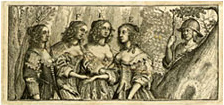Mark Lewis, An Essay to Facilitate the Education of Youth (1674)
Full Text
Not available
EEBO/TCP
Not available
Date
1674
Author
Book title
An Essay To Facilitate The Education of Youth, By Bringing down the Rudiments of Grammar to the sense of Seeing, which ought to be improv'd by Syncrisis. Fitted to Childrens Capacities, for the learning, especially of the English, Latin and Greek Tongues: but may be as a general Grammar, and a Foundation to any Tongue: in Three Parts, An Accidence, a Middle-Grammar, and a Critical or Idiomatical Grammar
Publication place
London
Publisher
Thomas Parkhurst
Text type
printed book
Genre
Grammars
Subject area
grammar
Summary
Remarks on the English language as well as explanations of grammatical terminology, and lists of Latin forms with English equivalents, generally organized by part of speech
Word-group
type: undifferentiated
Word-entry
type: logical
sample: The English Tongue hath two great advantages above most other Languages, (1.) The words stand in a natural order, as we think them, only the Adjective stands before the Substantive, which should stand after: because we think of the thing first, then we think of the manner of it. This may be said to justifie us; the thing comes into our thoughts through the senses by the quality, which are Adjectives in the concrete: but I will not contend about it. We begin now to place our words in a more elegant order than formerly; it is rather a disadvantage to our Language than otherwise; our Tongue is not so intelligible. (2.) We express our Cases and Moods and Tenses, by a few Particles, which the Latin and Greek express by terminations: Hence it is, we have but a very few terminations, in the Substantive we have but two endings, song, songs: In the Latin and Greek we have above fifty. The Adjective in the English hath but one ending. It is not varied: In the Latin and Greek there are above thirty. The Verb as well performs its office by three endings, as the Latin by six hundred, and the Greek by six thousand, plus minus. I do not know any thing that may be spar'd in the English but two Preter Tenses. There are three; one might serve the turn. (p. 5)
sample: The English Tongue hath two great advantages above most other Languages, (1.) The words stand in a natural order, as we think them, only the Adjective stands before the Substantive, which should stand after: because we think of the thing first, then we think of the manner of it. This may be said to justifie us; the thing comes into our thoughts through the senses by the quality, which are Adjectives in the concrete: but I will not contend about it. We begin now to place our words in a more elegant order than formerly; it is rather a disadvantage to our Language than otherwise; our Tongue is not so intelligible. (2.) We express our Cases and Moods and Tenses, by a few Particles, which the Latin and Greek express by terminations: Hence it is, we have but a very few terminations, in the Substantive we have but two endings, song, songs: In the Latin and Greek we have above fifty. The Adjective in the English hath but one ending. It is not varied: In the Latin and Greek there are above thirty. The Verb as well performs its office by three endings, as the Latin by six hundred, and the Greek by six thousand, plus minus. I do not know any thing that may be spar'd in the English but two Preter Tenses. There are three; one might serve the turn. (p. 5)
Alston
XVI.311
Wing
L1842




